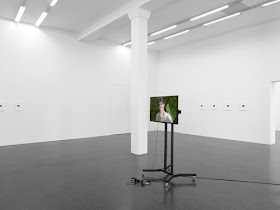
(
link)
Wolfson made clear that Irony could be weaponized. And here a CSI spoof becomes Sirens' lure, showcasing the world as a way-more-than-directionless cast of characters flailing at even the start of existential questions, obliviousness becoming a goofball existentialism, Caddyshack meets Nausea, and the wait for Godot replaced by a boneheaded stonerism, the absurdity cranked to 11 on a world that reflects not bleakness, but the barren stupidity of Hollywood cliche. When a character - in a spark of clarity - decides to de-mire themselves from the bog of their helplessness, "change the world," the plan ultimately involves selling mermaid meat to the rich. Hopes dashed, and meaning becomes a jumbled mess that ultimately catalyses the apathy it depicts, and the plot is obviously lost to a the gaseous settling of I'm-not-even-able-to-mean into the cracks of everything, interspersed with a few solid jokes. It's just a prank, Bro, and non-sequitur the major currency of comedy today.
As David Robbins becomes evermore relevant, the problem of artists moving closer to mainstream forms is that one enters into direct competition with people who are professionals at it. And this risk of wild amateurism in comparison makes risk averse artist shy. Artists obviously do something different. The metaphysical pondering of the mermaid is probably the highlight of the short, and the jokiest question becomes the most pertinent for art, "How can you move into the future riding a dinosaur?"





























